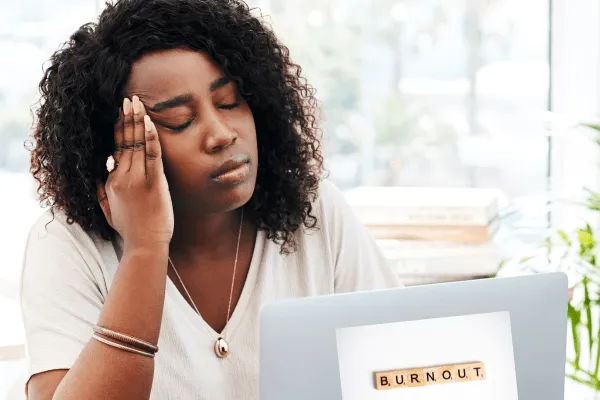
Menopause Burnout? How to Reignite Your Energy & Feel Like Yourself Again
Do you feel like you’re running on empty, no matter how much you rest? You’re not alone. February brings winter fatigue, fading New Year’s motivation, and stress overload—and for women navigating menopause, it can feel like exhaustion is taking over your life.
The worst part? You’re doing everything “right,” but still feel drained.
More coffee? Barely helps.
More sleep? Still waking up groggy.
Pushing through? Just leaves you more exhausted.
This isn’t just in your head. Menopause fatigue is real and there’s a scientific reason behind it.
The good news? You CAN get your energy back—with the right strategies.

Why Do You Feel Exhausted During Menopause (And It’s Not Just You!)
Fatigue during menopause isn’t just “normal aging” or regular stress—it’s the result of real biological changes happening in your body.
Here’s what’s really going on:
The Hormone Crash – Oestrogen, progesterone, and testosterone (yes, women have testosterone!) all play key roles in energy production. As these hormones decline, your body struggles to regulate energy, making you feel sluggish.
The Cortisol Rollercoaster – Menopause makes your body more sensitive to stress, leading to higher cortisol levels (the stress hormone). When cortisol is constantly high, your body stays in fight-or-flight mode, which leads to burnout and crashes.
Sleep Sabotage – Hot flashes, night sweats, and anxiety disrupt deep sleep cycles. Even if you sleep for 8 hours, you might not be getting enough restorative sleep—which explains why you wake up still feeling exhausted.
Nutrient Deficiencies – Menopause changes how your body absorbs nutrients. If you’re low in iron, vitamin D, magnesium or B12, it can dramatically drain your energy.
Blood Sugar Swings – Oestrogen helps regulate insulin, so when it drops, your blood sugar becomes unstable—leading to energy crashes, cravings, and brain fog.
What’s Really Draining Your Energy? (The 3 Hidden Culprits)
1️⃣ The Cortisol Overload: Why Stress is Stealing Your Energy
Your body sees all stress as a threat, whether it’s a big work deadline or simply forgetting your grocery list. During menopause, your body has a harder time regulating cortisol, making small stressors feel overwhelming.
Quick Fix: The 60-Second Cortisol Reset Try this simple breathing exercise to lower cortisol in less than a minute:
· Inhale through your nose for 4 seconds.
· Hold your breath for 4 seconds.
· Exhale slowly for 6 seconds.
· Repeat 3 times.
This signals to your nervous system: "I’m safe. I can relax." Do this before meals, in traffic or anytime you feel stress creeping in.
2️⃣ The "Fake Energy" Trap: Caffeine & Sugar Crashes
When energy is low, it’s tempting to reach for coffee or a sugary snack. But here’s the problem: Caffeine spikes cortisol and can play havoc with your sleep (especially if consumed later in the day).
Sugar gives you a quick rush, but the crash leaves you even more tired an hour later.
Quick Fix: Try the "Smart Swap" Trick Instead of reaching for another coffee or sugary snack, try:
✅ A handful of almonds + a square of dark chocolate (steady energy without the crash).
✅Green tea (gentle caffeine boost without cortisol overload).
✅A protein-rich smoothie (balanced energy and brain power!).
3️⃣ The Sleep Struggle: Why You’re Tired No Matter How Much You Rest
Menopause messes with your sleep cycle, leading to light, restless sleep that leaves you drained. The worst part? Sleep struggles cause more cortisol spikes—making fatigue even worse.
Quick Fix: Try This "Magic Magnesium" Night-time Routine
1️⃣ Take a magnesium glycinate supplement 30 minutes before bed.
2️⃣ Dim lights and turn off screens 1 hour before bed (blue light blocks melatonin!)
3️⃣ Drink a calming tea like chamomile or valerian root.
4️⃣ Keep your bedroom cool and dark.
This simple routine may reduce night sweats, calms your nervous system, and improves deep sleep—so you wake up feeling refreshed, not drained.

How to Reignite Your Energy & Feel Like Yourself Again
Feeling energized again is totally possible—but it’s about working with your body, not against it.
Your Energy-Boosting Action Plan (Start Today!)
✔ Balance Blood Sugar – Eat protein, healthy fats, and fibre with every meal to avoid energy crashes.
✔ Reduce Caffeine After Noon – Swap that afternoon coffee for green tea or herbal tea.
✔ Get Sunlight First Thing in the Morning – Morning light regulates cortisol and improves sleep.
✔ Move (But Don’t Overdo It!) – Low-impact workouts like walking, yoga, or strength training boost energy without draining you.
✔ Take Magnesium & Vitamin D – These boost sleep and fight fatigue.
✔ Prioritize Rest & Recovery – Schedule downtime—your body needs it now more than ever!
Final Thoughts:
Small Steps = Big Energy Gains
Menopause fatigue is real but you don’t have to accept exhaustion as your new normal.
The key? Is to start with small consistent changes. Start today by picking ONE fix from this list—whether it’s a sleep tweak, stress reset or blood sugar balance trick.
I’d love to hear from you!
What’s your biggest struggle with menopause fatigue? Comment below or reply to this post—
If you’re ready for personalized support, let’s chat! BOOK A FREE MENO CHAT HERE
You’ve got this!
